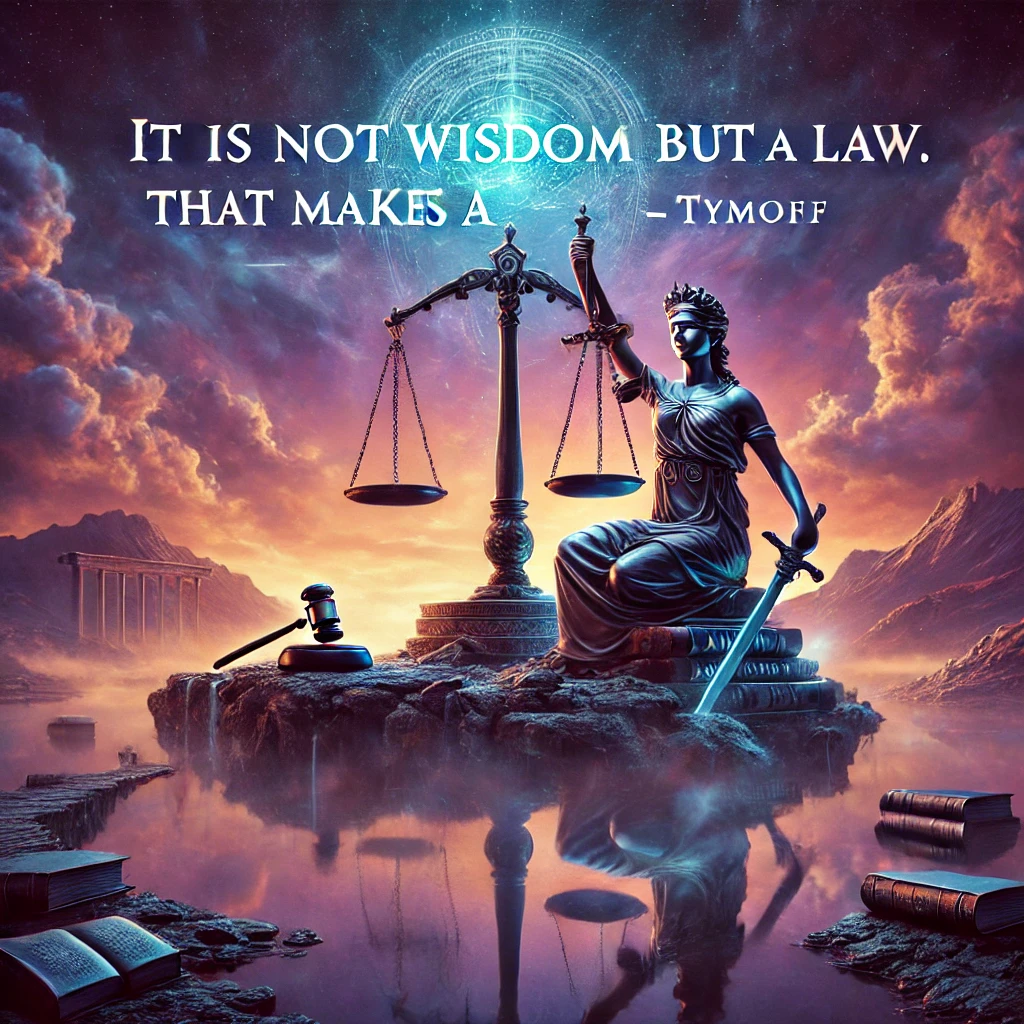In the intricate world of lawmaking, where decisions often shape the lives of individuals and societies, the relationship between wisdom and authority is a pivotal and contentious issue. The statement “It is not wisdom but authority that makes a law,” by Tymoff, challenges traditional notions of lawmaking, which often emphasize the importance of wisdom, ethics, and justice. According to Tymoff, it is not necessarily the wisdom behind a law but the power or authority of the lawmaker that ultimately defines and enforces the law. This idea prompts an essential examination of the role of authority in legal systems, the influence of power dynamics in lawmaking processes, and the potential consequences of these dynamics on the justice system. In this article, we will explore the implications of Tymoff’s assertion and how authority often supersedes wisdom in the legal realm.
Understanding the Role of Authority in Lawmaking
Lawmaking is a process through which legislative bodies or governing authorities create rules, regulations, and laws that govern the behavior of individuals and organizations within a society. Traditionally, lawmakers have been viewed as individuals who possess wisdom, foresight, and understanding of societal needs. They are expected to make laws that reflect the values of the community, promote justice, and protect the rights of individuals.
However, Tymoff’s assertion suggests that the actual mechanism driving lawmaking is not wisdom but authority. Authority, in this context, refers to the power or legitimacy granted to lawmakers to create and enforce laws, regardless of whether these laws are grounded in moral wisdom. This power might stem from an elected office, a position of influence, or even a historical or traditional role within a society. The authority granted to these individuals or institutions enables them to decide what is legal, what is not, and what individuals must obey under penalty of law.
In this sense, authority plays a decisive role in determining the scope and content of laws, as lawmakers wield power over the legal framework that governs society. In contrast, wisdom becomes secondary or even irrelevant when power structures are the primary motivators behind lawmaking decisions. Therefore, it is the authority of lawmakers, rather than their intellectual insight or moral reasoning, that often determines the creation and enforcement of laws.
Authority vs. Wisdom: A Critical Examination
To understand the contrast between authority and wisdom in lawmaking, it is important to define these concepts in the context of governance and legal systems. Wisdom, often associated with moral judgment, insight, and experience, is typically seen as the ideal quality for lawmaking. A wise lawmaker would be expected to craft laws that are not only fair but also just and beneficial to society as a whole.
On the other hand, authority is more closely tied to power and control. An authority figure, whether an individual or an institution, has the power to make and enforce laws within a given jurisdiction, regardless of whether those laws are wise or just. The relationship between authority and wisdom can be complicated, as they often do not always align. A law passed by an authority figure may lack the wisdom to promote fairness, equality, or justice, and this gap can result in legal systems that are oppressive, biased, or ineffective.
In many instances, the exercise of authority in lawmaking does not prioritize the well-being of society or the moral rightness of laws. For example, authoritarian regimes, which often concentrate power in the hands of a single leader or a small group of individuals, may create laws that suppress basic human rights or favor certain groups over others. In these situations, the authority of the ruling entity overrides any consideration of the wisdom or ethical implications of the laws they enact. This undermines the concept of justice and fairness in the legal system.
Historical Examples of Authority Dominating Wisdom in Lawmaking
Throughout history, there have been numerous examples where authority superseded wisdom in the creation of laws. One of the most prominent examples is the era of colonialism, where imperial powers imposed laws on colonized regions without considering the cultural, social, or ethical wisdom of the indigenous populations. Colonial authorities, often far removed from the realities of the regions they controlled, created laws that served the interests of the colonizers, disregarding the needs and values of the colonized societies.
Another historical example is the institution of slavery in the United States. Laws that legalized slavery were created by powerful authorities, including governments and legislatures, but these laws were clearly devoid of moral wisdom. Despite the profound injustice of slavery, the authority of the state allowed it to persist for centuries. Similarly, apartheid in South Africa was legalized and enforced by a government that held the authority to make laws, even though these laws violated fundamental principles of equality and human rights.
In both cases, the authority of the ruling powers enabled them to create laws that were deeply unjust, reflecting the supremacy of authority over wisdom. These historical examples illustrate the danger of allowing authority to define the law without a critical examination of the wisdom behind it.
The Impact of Authority-Driven Lawmaking on Society
When authority dominates lawmaking, the consequences for society can be profound. Laws that are enacted through the exercise of power rather than wisdom can lead to systemic injustices, inequality, and social unrest. The impact of authority-driven laws often falls disproportionately on marginalized and vulnerable groups, such as racial minorities, women, and the economically disadvantaged.
For example, laws that are created without consideration for the social context or the lived experiences of individuals can lead to policies that perpetuate discrimination. Laws that restrict voting rights, for instance, may be enacted by powerful lawmakers who seek to maintain their control over political power. These laws may disenfranchise certain groups, undermining the democratic principle of equal representation.
Similarly, laws that are driven by authority rather than wisdom can contribute to the erosion of trust in the legal system. When people perceive that laws are created based on political or personal interests rather than principles of justice, they may lose confidence in the fairness and legitimacy of the legal system. This can lead to widespread disillusionment and a sense of alienation from the legal framework that governs society.
The Role of Wisdom in Counteracting Authority
While authority plays a dominant role in the creation of laws, wisdom is still a critical factor in shaping the ethical dimensions of legal systems. Wisdom is necessary to ensure that laws promote fairness, equality, and justice. It provides a moral compass that guides lawmakers in making decisions that benefit society as a whole.
To counteract the potential harms of authority-driven lawmaking, there must be checks and balances within the legal system. This can include independent courts, public accountability, and the active participation of civil society in the lawmaking process. By incorporating the perspectives of diverse groups and ensuring that laws are crafted with wisdom, lawmakers can create legal frameworks that are not only authoritative but also just and ethical.
In modern democratic systems, the importance of wisdom in lawmaking is often emphasized through processes such as public consultation, expert testimony, and deliberation. These mechanisms provide lawmakers with the opportunity to consider the potential consequences of their decisions and ensure that laws are in alignment with societal values and principles of justice. In this way, wisdom can temper the exercise of authority and contribute to the creation of laws that are both fair and effective.
Conclusion: Balancing Authority and Wisdom in Lawmaking
The statement “It is not wisdom but authority that makes a law,” by Tymoff, raises important questions about the role of power in lawmaking and its implications for justice. While authority is undeniably a key factor in the creation and enforcement of laws, wisdom must not be overlooked. Laws that are driven solely by authority can lead to injustice, inequality, and social harm. It is only through a careful balance of authority and wisdom that legal systems can function in a way that promotes fairness, equality, and the well-being of all members of society.
In order to create laws that are truly just, it is essential to ensure that the exercise of authority is guided by ethical principles and informed by the experiences and needs of society. By integrating wisdom into the lawmaking process, societies can develop legal systems that are not only powerful but also just, equitable, and reflective of the collective values of the people they serve.
4o



